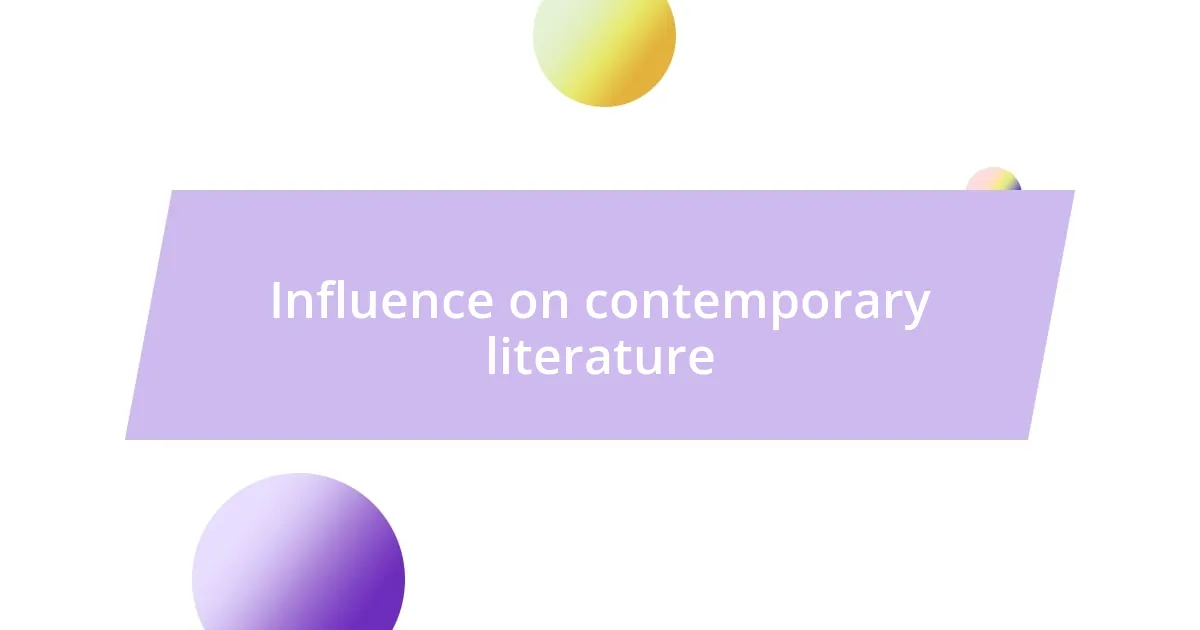Key takeaways:
- Svetlana Alexievich’s works focus on personal narratives that highlight trauma, resilience, and the impact of historical events, particularly war and disaster.
- Her narrative techniques include using direct quotations, layering disparate stories, and emphasizing mundane details to evoke emotional depth and authenticity.
- Alexievich’s blending of oral history and literary prose has influenced contemporary literature, encouraging writers to explore personal experiences and diverse perspectives.
- Key lessons from her storytelling emphasize the importance of listening to others’ experiences and viewing hardships as opportunities for growth and understanding complex truths.

Overview of Svetlana Alexievich’s works
Svetlana Alexievich’s works are a tapestry of personal narratives woven from the fabric of human experience, often exploring the psychological scars left by war and tragedy. I remember my first encounter with “War’s Unwomanly Face” and how it struck me with its raw honesty — the voices of women who faced unimaginable hardships echoed in my mind long after I set the book down.
In her groundbreaking text “Voices from Chernobyl,” Alexievich doesn’t just document the nuclear disaster; she encapsulates the emotions of those affected, which, frankly, left me feeling an acute sense of connection to their pain and resilience. How is it that a single event can reshape so many lives yet bring forth stories of unyielding courage? It’s a question that lingers with me, prompting reflection on our shared humanity amid catastrophe.
Alexievich’s meticulous research and commitment to oral history create a unique literary experience that feels both deeply personal and universally compelling. I can’t help but admire how she captures silence — those unspoken thoughts and feelings — and transforms them into powerful testimonies that resonate with readers worldwide. It makes me wonder: what stories lie unheard in our own communities, waiting for someone to give them a voice?

Themes in Alexievich’s literature
Alexievich’s literature is permeated with the themes of trauma and resilience, which resonate deeply with readers. During my exploration of her works, I found the intertwining of individual suffering and broader historical events strikingly poignant. It evokes a sense of empathy that lingers with me, as I grasp the ongoing struggle of those who confront unimaginable despair.
- The impact of war on human psyche.
- The voices and stories of women in conflict.
- The interplay of memory and historical trauma.
- The resilience born from collective suffering.
- The fragility of life in the aftermath of disaster.
- The quest for understanding in the face of loss.
In reading Alexievich, I have often been reminded of how significant it is for us to be bearers of stories — to recognize the weight they carry and the hope they often convey. Each narrative reveals not just a personal journey, but also sheds light on humanity’s capacity to endure and heal through shared experience.

Narrative techniques used by Alexievich
Alexievich employs an intricate blend of narrative techniques that amplify the emotional weight of her subjects. One notable approach is her use of direct quotations, which breathe life into the voices she captures. I recall feeling as if I were right there with the individuals sharing their experiences, their words resonating with authenticity. Each statement not only adds dimension to their stories but invites readers to forge a personal connection, almost as though we’re participating in an intimate conversation.
Another remarkable technique is her ability to layer disparate narratives, creating a rich tapestry of experiences that reflect broader societal truths. I remember getting lost in “Voices from Chernobyl,” where individual accounts wove together to form a haunting picture of collective trauma. It struck me how these various threads intertwined – each narrative a vital piece that, when combined, offered a profound insight into the human condition post-disaster.
Moreover, Alexievich’s meticulous attention to detail in the mundane aspects of life amidst catastrophe drives home the emotional stakes of her narratives. I often found myself reflecting on how a simple recollection, like picking flowers or cooking, juxtaposed against the backdrop of survival becomes incredibly powerful. This technique served to remind me of the fragility and resilience of human life, a theme that reverberates through her works.
| Narrative Technique | Description |
|---|---|
| Direct Quotations | Captures authenticity and creates connection through personal voices. |
| Layering Narratives | Weaves together individual stories to highlight collective experiences and societal truths. |
| Attention to Detail | Emphasizes the significance of everyday moments amidst disaster, enhancing emotional resonance. |

Impact of historical context
The historical context within which Alexievich writes profoundly shapes her narratives. For instance, the aftermath of Chernobyl isn’t just a backdrop; it frames the despair and resilience of individuals struggling with loss. I vividly remember reading a survivor’s account that brought me to tears, making me ponder how history’s tragedies ripple through generations. How do we truly comprehend the effects of such monumental events on personal identities?
The trauma of war, especially in the context of the Soviet Union, is another layer that colors her work. I often reflect on how the voices of women, often silenced, emerge with such clarity in her writings, showcasing their strength amid chaos. There was a particular story that lingered with me, where a woman described losing her home yet finding solace in the community around her. It made me realize how historical upheavals redefine roles and foster unexpected resilience.
Moreover, the interplay between memory and trauma is essential to understanding Alexievich’s impact. Her interviews reveal how personal recollections intertwine with collective histories, creating a tapestry of human experience. When I think about this, I can’t help but ask: What stories do we carry from our own pasts? These reflections remind me that while historical contexts can shape us, they also offer profound opportunities for healing and understanding.

Influence on contemporary literature
The influence of Svetlana Alexievich on contemporary literature is palpable and far-reaching. Her pioneering use of oral history as a literary form challenges writers to embrace the authenticity of personal experiences. When I read her works, I was struck by how she shepherds voices often left unheard into the literary domain. This has inspired many authors to adopt similar methods, allowing readers to immerse themselves in the lived realities of individuals rather than just fictional narratives. Isn’t it fascinating how one writer can reshape the storytelling landscape?
Furthermore, Alexievich’s blending of genres—melding journalism with literary prose—encourages today’s writers to experiment more boldly with their voices. I remember picking up a more recent work influenced by her approach and feeling exhilarated by the raw honesty and emotional depth. It made me think: how might our understanding of truth change if literature were to include even more perspectives? This blending creates a richer literary tapestry, one that resonates with an increasingly diverse readership eager for genuine connections through words.
Lastly, the themes she explores—trauma, resilience, and the human spirit—have become a touchstone for contemporary authors grappling with similar subjects. I have seen how writers now often echo the complexities of personal and collective histories in their narratives, drawing inspiration from her fearless exploration of difficult topics. As I reflect on this, I wonder: what stories of resilience are waiting to be uncovered in our own communities? It’s a beautiful reminder that literature has the power to connect us more deeply to our shared humanity, a legacy that Alexievich continues to inspire.

Lessons from Alexievich’s storytelling
Svetlana Alexievich’s storytelling teaches us the importance of listening, really listening, to the voices around us. I recall a moment when I sat down with an elderly neighbor to hear her stories about living through the war. Her eyes lit up with memories, and I realized how each personal narrative carries layers of history and emotion. It makes me wonder: how often do we take the time to engage with the stories of others, and what truths might we unlock by doing so?
Another lesson from Alexievich’s work is the profound connection between pain and resilience. In reading about the Chernobyl disaster, I found myself grappling with the contrasting emotions of deep sorrow and astonishing strength. There was something haunting about the way survivors spoke of their experiences, and it prompted me to reflect on my own struggles. What if we viewed our hardships as pathways to personal growth rather than obstacles? It’s a powerful perspective that can shift how we approach our own challenges.
Moreover, her narrative style—layering voices and perspectives—highlights the complexity of truth itself. I remember feeling overwhelmed reading multiple accounts of the same event, each tinged with different emotions and insights. It made me question my own understanding of truth: could it be more subjective than I ever considered? This approach invites readers to engage critically with narratives, challenging us to embrace ambiguity and appreciate the many facets of human experience.













